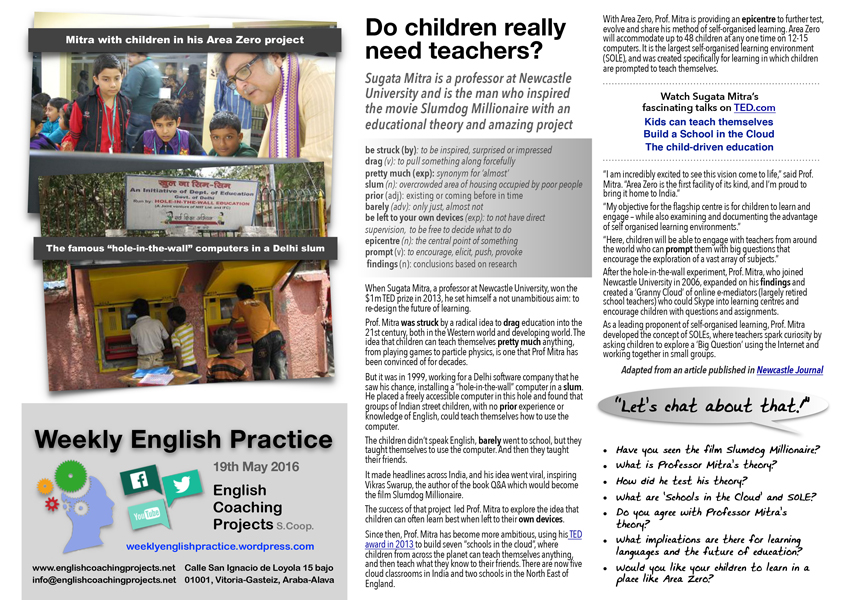Click on the image to download the pdf
Sugata Mitra is a professor at Newcastle University and is the man who inspired the movie Slumdog Millionaire with an educational theory and amazing project
Vocabulary. Read and check you understand this before you read and listen to the article:
be struck (by): to be inspired, surprised or impressed
drag (v): to pull something along forcefully
pretty much (exp): synonym for ‘almost’
slum (n): overcrowded area of housing occupied by poor people
prior (adj): existing or coming before in time
barely (adv): only just, almost not
be left to your own devices (exp): to not have direct supervision, to be free to decide what to do
epicentre (n): the central point of something
prompt (v): to encourage, elicit, push, provoke
findings (n): conclusions based on research
When Sugata Mitra, a professor at Newcastle University, won the $1m TED prize in 2013, he set himself a not unambitious aim: to re-design the future of learning.
Prof. Mitra was struck by a radical idea to drag education into the 21st century, both in the Western world and developing world. The idea that children can teach themselves pretty much anything, from playing games to particle physics, is one that Prof Mitra has been convinced of for decades.
But it was in 1999, working for a Delhi software company that he saw his chance, installing a “hole-in-the-wall” computer in a slum. He placed a freely accessible computer in this hole and found that groups of Indian street children, with no prior experience or knowledge of English, could teach themselves how to use the computer.
The children didn’t speak English, barely went to school, but they taught themselves to use the computer. And then they taught their friends.
It made headlines across India, and his idea went viral, inspiring Vikras Swarup, the author of the book Q&A which would become the film Slumdog Millionaire.
The success of that project led Prof. Mitra to explore the idea that children can often learn best when left to their own devices.
Since then, Prof. Mitra has become more ambitious, using his TED award in 2013 to build seven “schools in the cloud”, where children from across the planet can teach themselves anything, and then teach what they know to their friends. There are now five cloud classrooms in India and two schools in the North East of England.
With Area Zero, Prof. Mitra is providing an epicentre to further test, evolve and share his method of self-organised learning. Area Zero will accommodate up to 48 children at any one time on 12-15 computers. It is the largest self-organised learning environment (SOLE), and was created specifically for learning in which children are prompted to teach themselves.
“I am incredibly excited to see this vision come to life,” said Prof. Mitra. “Area Zero is the first facility of its kind, and I’m proud to bring it home to India.”
“My objective for the flagship centre is for children to learn and engage – while also examining and documenting the advantage of self organised learning environments.”
“Here, children will be able to engage with teachers from around the world who can prompt them with big questions that encourage the exploration of a vast array of subjects.”
After the hole-in-the-wall experiment, Prof. Mitra, who joined Newcastle University in 2006, expanded on his findings and created a ‘Granny Cloud’ of online e-mediators (largely retired school teachers) who could Skype into learning centres and encourage children with questions and assignments.
As a leading proponent of self-organised learning, Prof. Mitra developed the concept of SOLEs, where teachers spark curiosity by asking children to explore a ‘Big Question’ using the Internet and working together in small groups.
“Let’s chat about that!”
- Have you seen the film Slumdog Millionaire?
- What is Professor Mitra’s theory?
- How did he test his theory?
- What are ‘Schools in the Cloud’ and SOLE?
- Do you agree with Professor Mitra’s theory?
- What implications are there for learning languages and the future of education?
- Would you like your children to learn in a place like Area Zero?
Adapted from an article published in Newcastle Journal


